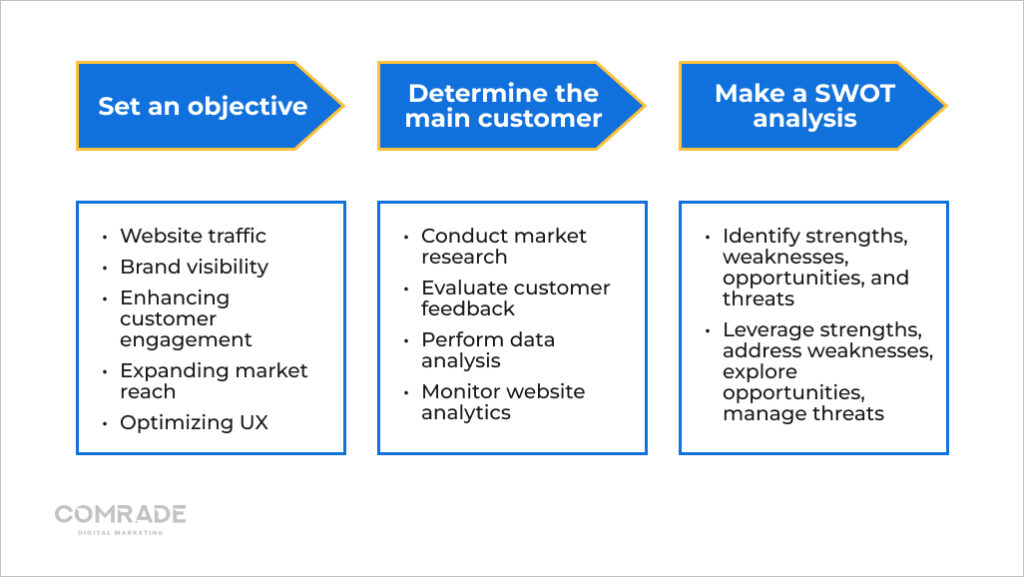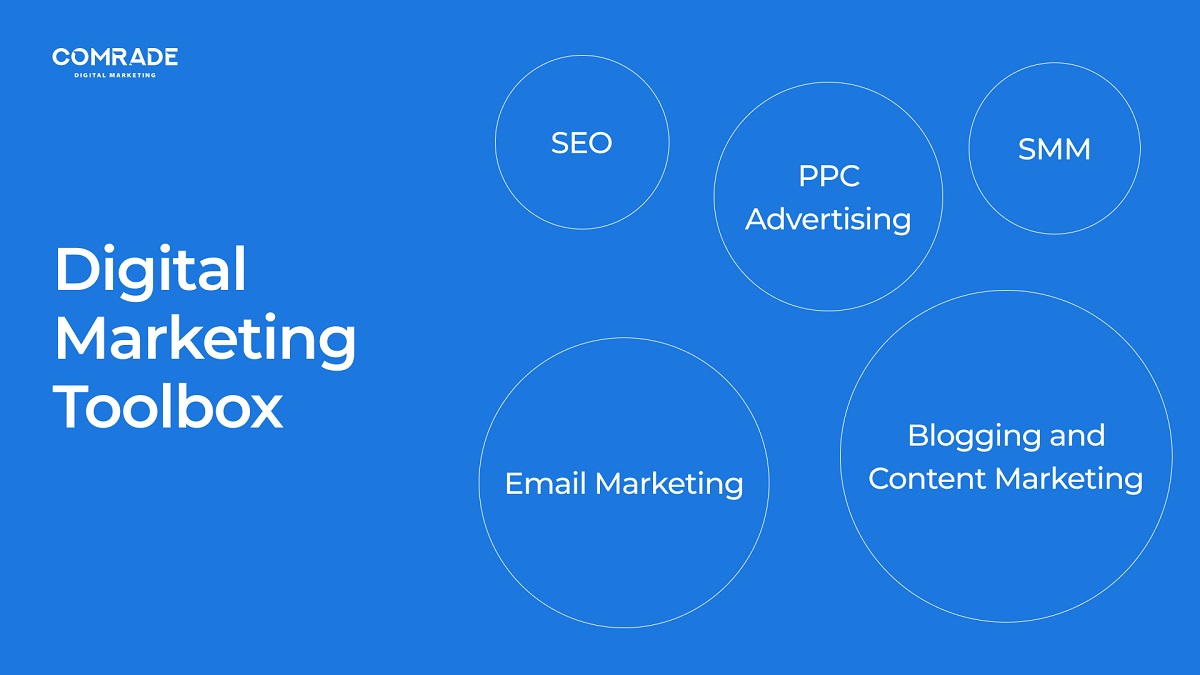
Do I Even Need a Marketing Plan?
On average, consumers see 5,000 ads every single day. Without a strategic marketing plan for eCommerce, your advertisements will drown in an overpopulated sea of content; Again, it’s crucial to have an e-commerce marketing plan in place, as marketing is one of the best revenue drivers.
Operating online provides useful analytics, allowing you to make data-backed decisions that provide results. Digital marketing offers fresh perspectives you may not have considered, especially when it comes to your target audience and ways of reaching them, making it essential to have an eCommerce digital marketing strategy as part of your eCommerce marketing campaign.
Preparing Your Platform
The average user spends 15 seconds on a website, so it’s important to ensure that your website is user-friendly and eye-catching before you even start thinking about an eCommerce marketing plan. At the very least, this should include website optimization through the user-friendly front and back-end design, as well as crafting technical SEO, mobile SEO, and using attractive visual assets as part of your ecommerce business marketing plan. If possible, it’s always a good idea to get professionals to help you with this foundational step in your ecommerce marketing strategy.
How Do I Create a Marketing Plan for Ecommerce?

Your e-commerce marketing plan is your blueprint. It outlines how your eCommerce business is positioned, who your target audience is, your core values, and how they inform your marketing. Below are a few steps to consider when creating a marketing plan for your eCommerce website launch:
1. Set an Objective for Your Ecommerce Business
While the end objective of every eCommerce online marketing plan is to increase sales, you still need to choose specific goals as they affect data-gathering metrics. Each campaign in an eCommerce website marketing plan might have a slightly different objective, which is why it’s important to define them clearly. For example, selling a particular product or just driving general traffic to your website can be defined as two separate goals and require different approaches.
2. Determine the Main Customer for Your Ecommerce Goods
Creating an effective eCommerce marketing plan requires data-backed strategies and audience targeting, as explained in any comprehensive eCommerce marketing guide. It’s essential to understand your primary customer group, which can later be segmented into smaller groups. You can define your customer by demographic, location, and online behavioral habits.
Basically, you need to have a clear idea of what you are selling and who you are selling it to from a marketing perspective. Once you’ve determined this, you should pick an appropriate customer relationship platform (CRM). This is a software application that helps eCommerce businesses run their daily operations by maximizing their customer communications and sales efforts.
3. Make a SWOT Analysis of Your Ecommerce Store
A SWOT analysis is a strategic planning technique used to help businesses identify their strengths, weaknesses, opportunities, and threats, particularly in the context of running an eCommerce site. Creating a SWOT analysis is one of the top eCommerce marketing tips we recommend to our clients.
It’s designed to push companies, including those in the eCommerce space, to evaluate their current standing and guide them toward exploring new initiatives. Influencer marketing, customer loyalty, and social media marketing are some key areas where eCommerce businesses can focus their efforts based on this analysis. Leveraging email marketing and other eCommerce marketing tactics can also help you stand out from the competition and boost eCommerce sales.
Your unique selling proposition, a critical element for eCommerce success, is central to this evaluation. Knowing how to position your eCommerce store is vital for crafting the best eCommerce marketing strategies.
Bring Out the Digital Marketing Toolbox

Digital marketing offers a diverse toolkit of eCommerce marketing strategies and techniques to reach your desired audience. You don’t have to implement all of them simultaneously; instead, you can gradually integrate them into your overall eCommerce marketing strategy. This is where a deep understanding of your main customer base becomes crucial, as their online behavior will shape the way you leverage these tools, including search engine optimization (SEO), influencer marketing, content marketing, and social media platforms, to enhance customer loyalty and grow your eCommerce store.
Search Engine Optimization
SEO, or search engine optimization, is a critical component of successful eCommerce marketing efforts. It involves optimizing various aspects of your eCommerce website to improve its ranking on search engines like Google. By strategically incorporating relevant keywords related to your products or services, you can boost your online store’s visibility in search engine results pages (SERPs).
This not only helps you attract potential customers but also drives organic traffic to your website. SEO is an essential part of any successful eCommerce marketing plan, as it allows eCommerce marketers to target their specific target audience effectively.
Delivering Business Results: Our Digital Marketing Case Studies
Pay-Per-Click Advertising
PPC (Pay-Per-Click) is an internet advertising model used to increase traffic to websites, whereby the advertiser pays every time their advert is clicked on. This method is essential in eCommerce marketing, as it drives targeted traffic to product pages, increases brand awareness, and can lead to higher online sales.
By using PPC, eCommerce marketers can specifically target their desired audience based on keyword research and create relevant content that resonates with their target market. It’s an effective way to reach potential new customers and drive traffic to eCommerce sites.
Blogging and Content Marketing
eCommerce marketing involves the creation and publication of user-generated content, including videos, blogs, and social media content. These strategies aim to stimulate interest in a brand’s products or services, attract website visitors, and engage with potential customers across various marketing channels, including social media marketing and search engines. Ultimately, the goal is to generate leads, convert them into paying customers, and cultivate a loyal customer base.
Email Marketing
Email marketing for eCommerce is a powerful strategy to enhance customer satisfaction, build a base of loyal customers, and boost customer retention within the eCommerce industry. This cost-effective approach can be particularly impactful when used in tandem with the rest of your marketing budget to promote your eCommerce website.
One valuable aspect of email marketing is its capacity for lead generation among your current customers. By creating user-generated content and fostering inbound marketing efforts, you can encourage customers to share their experiences, contributing to your reputation and lead generation.
Social Media Marketing
Social Media Marketing (SMM) is a crucial aspect of any eCommerce marketing strategy. Leveraging popular social media platforms like Facebook, Instagram, Twitter, LinkedIn, and TikTok can significantly impact your online store’s success.
By employing effective eCommerce marketing strategies on these platforms, you can boost sales, increase brand awareness, and drive organic traffic to your eCommerce websites. Additionally, implementing referral marketing and local marketing techniques within your SMM efforts can further enhance your reach and engagement, ultimately leading to greater eCommerce success.
Keep an Eye on the Progress of Your Marketing Plan
It’s important to bear in mind that your digital eCommerce marketing plan should always be monitored and remain flexible as algorithms, trends, and consumer behavior changes. Real-time data makes it easy to adapt tactics and test which marketing strategies work best. Being agile ensures your eCommerce business will always come out on top.
Conclusion
Creating your first e-commerce marketing plan may seem daunting, but with a structured approach, you can set your online business on the path to success. Let’s recap the essential steps:
- Set Clear Objectives: Begin by defining your eCommerce business goals and what you aim to achieve through your marketing efforts.
- Identify Your Target Audience: Understand your ideal customer profile and create detailed buyer personas to tailor your strategies effectively.
- Conduct a SWOT Analysis: Evaluate your online store’s strengths, weaknesses, opportunities, and threats to formulate a well-rounded plan.
- Choose the Right Marketing Channels: Select the most suitable digital marketing channels, such as social media, email marketing, SEO, and PPC, based on your audience and objectives.
- Create Content and Campaigns: Develop engaging content and campaigns that resonate with your target audience and align with your business objectives.
- Analyze and Adjust: Continuously monitor the performance of your marketing efforts, gather data, and adjust your plan as needed to optimize results.
Remember, success in e-commerce requires a well-thought-out marketing plan tailored to your unique business. If you’re seeking expert guidance and support in crafting a winning strategy, reach out to Comrade, a trusted agency specializing in web design, development, and digital marketing. With our help, you can differentiate your brand, outshine the competition, and generate more leads for greater revenue. Contact Comrade at (312) 265-0580 or click here to schedule your complimentary digital marketing consultation.









